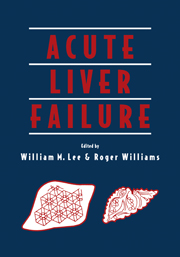Book contents
- Frontmatter
- Contents
- Preface
- Foreword
- Acknowledgments
- Contributors
- Part One Clinical Syndrome and Etiology
- Part Two Mechanisms of Disease and Multisystem Involvement
- Part Three Intensive Care Management
- Part Four Transplantation
- Part Five Artificial and Bioartificial Liver Devices
- Part Six Other Applications
- Index
- Plate section
Foreword
Published online by Cambridge University Press: 20 May 2010
- Frontmatter
- Contents
- Preface
- Foreword
- Acknowledgments
- Contributors
- Part One Clinical Syndrome and Etiology
- Part Two Mechanisms of Disease and Multisystem Involvement
- Part Three Intensive Care Management
- Part Four Transplantation
- Part Five Artificial and Bioartificial Liver Devices
- Part Six Other Applications
- Index
- Plate section
Summary
Acute liver failure is a highly complex syndrome arising when acute liver cell damage causes the breakdown of vital functions of the normal liver within a few days or weeks. Clinical encephalopathy, which is usually considered to be the hallmark of the syndrome, is always preceded by a rapid decrease in coagulation factors.
The incidence of the syndrome has been estimated to be 2000 cases a year in the United States and roughly 150 cases a year in France. Such a low incidence explains why, in all too many patients, the diagnosis of acute liver failure is so often delayed. The complexity of the syndrome is reflected in the numerous designations used by hepatologists and is due both to its multiplicity of effects on various organs – mainly brain and kidney – and the diversity of the causes.
Although acute viral hepatitis is the predominant cause worldwide, there are numerous other causes. Some of these, for example Wilson's disease, autoimmune hepatitis, and acute fatty liver of pregnancy, are uncommon, but their early recognition and specific treatment prevent acute liver failure, and this is undoubtedly the best strategy to adopt.
Acute liver failure often develops in previously healthy young adults or even children. The particular difficulty in the clinical management of such patients is determining whether they belong to that 25% on average who will recover spontaneously. Therefore, when presented with acute liver failure, many questions arise that need to be answered as quickly as possible without adding the further complication of iatrogenic aggravation: What is the cause?
- Type
- Chapter
- Information
- Acute Liver Failure , pp. xiii - xivPublisher: Cambridge University PressPrint publication year: 1996

